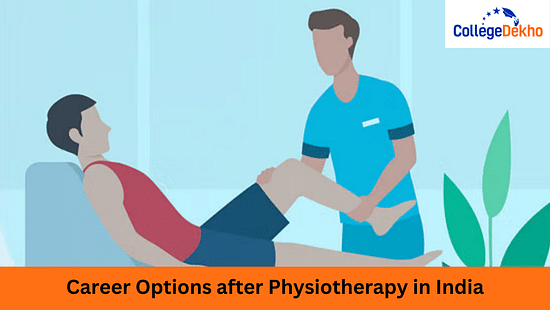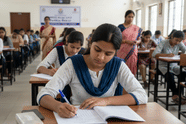Career Options after Physiotherapy in India include several designations like Osteopath, Geriatrics physiotherapist, Hospital physiotherapist, Personal Trainer, entrepreneur, chiropractor, and more. Check details here!
- List of Career Options after Physiotherapy
- Emerging Trends in Career Options after Physiotherapy
- Scope of Physiotherapy in India
- Diploma in Physiotherapy Vs Bachelors in Physiotherapy
- Specializations in Physiotherapy
- Salary after Physiotherapy in India
- Post Wise Physiotherapist Salary in India
- Career Options after Physiotherapy In India
- Skills Needed for a Career in Physiotherapy
- Top Colleges Offering Physiotherapy Courses in India
- Faqs

Career Options after Physiotherapy in India include jobs like acupuncturists, Post-operative physiotherapists, Sports Physio Rehabilitators, Physiotherapy researchers, Ergonomic consultants, Musculoskeletal physiotherapists etc. The scope of Physiotherapy in India is diverse since the healthcare sector of the country is expanding rapidly. A physiotherapy graduate can work in both the government and the private healthcare sectors. A psychotherapy professional is well trained in rehabilitation techniques, prevention of post-operative injuries, and the overall well-being of their patients during their course. The average salary scale of career options after Physiotherapy in India ranges from Rs. 2,50,000 to Rs. 10,00,000 per annum. The popular areas where candidates can find jobs after Physiotherapy are hospitals, clinics, nursing homes, sports organizations, and rehabilitation clinics. Some of the top recruiters for physiotherapy graduates in India are Apollo Hospitals, Max Healthcare Institue Ltd, Jiva Ayurveda, Hospitals, and Sports Authority of India. In this article, know in detail about the career options after physiotherapy, job scope, emerging trends, top recruiters and more.
List of Career Options after Physiotherapy
Since the health sector of the country is constantly changing, the scope of Physiotherapy in India is diverse. There are various popular jobs available after Physiotherapy in India. Some of the popular career options after Physiotherapy in India include Physiotherapists, Neurological physiotherapists, Therapy Managers, and Pediatric physiotherapists. Here we have discussed in detail the designations/job opportunities after Physiotherapy.Career Options after Physiotherapy | Details |
|---|---|
Physiotherapist | A Physiotherapist treats physical injuries and disabilities through exercises and therapies, aiming to restore mobility and reduce pain effectively. They also educate patients on preventive measures and lifestyle modifications for long-term wellness. |
Health Service Manager | Oversees administrative aspects of healthcare facilities to ensure efficient delivery of services, optimizing patient care outcomes. These health service managers also collaborate with medical staff to develop strategies for quality improvement and resource management. |
Chiropractor | One of the most known career options after Physiotherapy in India is the job profile of a Chiropractor. They specialize in diagnosing and treating musculoskeletal disorders, focusing on spinal health and alignment, using manual manipulation techniques. Chiropractors also provide education and counselling on posture, ergonomics, and lifestyle adjustments for holistic well-being. |
Acupuncturist | Uses acupuncture to stimulate energy flow and promote balance within the body, facilitating natural healing processes. They also assess patients' overall health and lifestyle factors to customize treatment plans for optimal results. |
Exercise Physiologist | Prescribes personalized exercise programs to improve health and fitness levels, considering individual needs and goals. They also conduct fitness assessments and monitor progress to modify programs as needed for continued success. |
Personal Trainer | PT or Personal Trainer designs customized exercise plans and guides to help clients achieve fitness goals, fostering motivation and accountability. Additionally, they offer nutritional advice and lifestyle coaching to support overall health and well-being. |
Entrepreneurship | Physiotherapists may also choose to start their private practice, offering specialized services, developing innovative treatment approaches, or providing consultancy services to other healthcare facilities. |
Emerging Trends in Career Options after Physiotherapy
Some significant changes and developments are seen in the healthcare industry of the country. With the introduction of new methodologies and technical pieces of equipment, the popularity of jobs is constant. Candidates aspiring to apply for Job Opportunities must be updated with the emerging trends. Here we have discussed in detail the emerging trends in career options after Physiotherapy.
Green Pharmacy Practices - One of the most updated trends in the pharmacy industry is sustainable practices. This means that minimizing medical and pharmaceutical waste comes under this emerging trend.
Integration of AI and Automation - Candidates interested in career options after Physiotherapy in India must be well acquainted with the concept of automation and AI. One of the trends in the physiotherapy industry is the incorporation of machine learning for more effective medical uses.
Digital Health - The introduction of telepharmacy and digital health are the direct impact of the Covid -19. The remote working facility is one of the emerging trends in the pharmacy industry.
Scope of Physiotherapy in India
The significance of physiotherapy courses in India has witnessed significant growth in recent years, resulting in a heightened demand for physical therapy and comprehensive healthcare services. These courses equip students with both theoretical and practical knowledge essential for assessing, diagnosing, and treating various physical discomforts and injuries. Below are the key aspects highlighting the scope of physiotherapy in the healthcare system.
- Diversity in Education : The field of physiotherapy education in India offers a broad range of academic alternatives, from master's and doctoral programs to diplomas and bachelor's degrees. With a focus on anatomy, physiology, kinesiology, exercise therapy, electrotherapy, and practical clinical training, these educational courses give students a thorough understanding of the human body and its mechanics.
- Versatility in Healthcare Uses : Physiotherapy has a wide range of uses in the Indian healthcare system. Following graduation from physiotherapy programs, individuals can pursue a variety of career paths, such as jobs in public and private hospitals, sports and fitness facilities, nursing homes, and rehabilitation centres.
- Growing Need and Opportunities for Careers : Expert physiotherapists are in greater demand as a result of India's changing healthcare needs. Physiotherapy treatments today include preventive care, rehabilitation, and the promotion of overall well-being in addition to injury management.
- Contribution to Public Health : Physiotherapists' growing impact on general health and well-being is highlighted by their incorporation into public health programs. Physiotherapists are essential in meeting the medical needs of many groups, especially in underprivileged and rural areas.
Also read:
Diploma in Physiotherapy Vs Bachelors in Physiotherapy
.
Specializations in Physiotherapy
Physiotherapy courses come with various specializations and branches that deal with different studies. The candidates can check from the wide variety of options. The candidates willing to pursue a Physiotherapy course can choose from multiple specializations while pursuing graduation/post-graduation, depending on their preferences. Based on their chosen discipline, physiotherapists can embark on specialized roles like:
- Cardiopulmonary physiotherapists: They help patients prevent or manage symptoms of bronchitis, asthma, and other cardio-respiratory disorders by suggesting various exercises
- Musculoskeletal physiotherapists: They treat various issues like sprains, strains, back pain, knee pain, arthritis, and other posture problems of the patients
- Post-operative physiotherapists: They help patients ease into walking after a major surgery or operation
- Sports physiotherapists: They help sports players reduce pain and reintroduce movement after a sports injury to make a comeback
- Neurological physiotherapists: They target disorders that affect the nervous system like strokes, brain injuries, Parkinson's disease, and Alzheimer's disease
- Pain management physiotherapists: They prescribe exercises to manage and reduce pain in body parts or joints
- Geriatric physiotherapists: They focus on treating the physical disorders affecting senior citizens
- Pediatric physiotherapists: They help rehabilitate children after an injury or disease and work with differently-abled children to allow movements to the extent possible.
Salary after Physiotherapy in India
The average salary scale for a Career in Physiotherapy ranges from Rs. 2,50,000 to Rs. 10,00,000 annually based on their experience. For instance, the salary for an entry-level job opportunity after Physiotherapy ranges from Rs. 2,00,000 to Rs. 4,50,000 per annum, while that of a professional-level designation varies from Rs. 6,00,000 to Rs. 10,00,000 annually. Students can find the average salary based on the course levels stated below.
Course Level | Average Salary |
|---|---|
Undergraduate courses | Rs. 2,00,000 - Rs. 8,00,000 |
Diploma Courses | Rs. 5,50,000 |
Certificate Course | Rs. 3,00,000 |
Post Graduate Courses | Up to Rs. 16,00,000 |
PhD | Rs. 5,00,000 – Rs. 20,00,000 |
Experience-Wise Physiotherapist Course Salary
The salary after completing a physiotherapist course is lucrative. Understand more physiotherapy course details about salary based on experience mentioned below.
Experience | Average Salary |
|---|---|
0 – 1 years | Rs. 2,76,000 LPA |
1 – 4 years | Rs. 2,95,000 LPA |
5 – 9 years | Rs. 3,66,000 LPA |
10 – 19 years | Rs. 4,78,000 LPA |
20+ years | Rs. 6,60,000 LPA |
Post Wise Physiotherapist Salary in India
The courses offer a wider range of medical knowledge, career exposure, and a potential earning option for students upon completion. As per the data, on average, BPT graduates are offered somewhere around Rs. 2,00,000 - 8,00,000 in India based on their experience. The detailed job-wise physiotherapist salaries in India are given below:
Job Profile | Average Salary in Physiotherapist in India |
|---|---|
Physiotherapist | Rs. 2,00,000 - 7,00,000 |
Lecturer | Rs. 5,00,000 - 6,00,000 |
Osteopath | Rs. 2,50,000 - 5,00,000 |
Self Employed Private Physiotherapist | Rs. 3,00,000 - 6,00,000 |
Sports Physio Rehabilitator | Rs. 5,00,000 - 7,00,000 |
Therapy Manager | Rs. 2,50,000 - 7,00,000 |
Read More: Career Options in Physiotherapy
Career Options after Physiotherapy In India
The career options after psychotherapy in India are lecturer, psychotherapist, osteopath, therapy manager, sports physio rehabilitator, lecturer etc. Students can go through the career options after physiotherapy in India stated below.
Job Profile | Top Recruiters | Average Salary Offered |
|---|---|---|
Physiotherapist | Apollo Hospitals, Max Healthcare Institue Ltd, Dr Lal Pathlabs | Rs. 2,00,000 - 7,00,000 |
Lecturer | Jamia Hamdard, AIIMS, Amity University, GD Goenka Univerisity, SGT University | Rs. 5,00,000 - 6,00,000 |
Osteopath | Jiva Ayurveda, Hospitals | Rs. 2,50,000 - 5,00,000 |
Therapy Manager | Apollo Hospital, Max Hospital, etc. | Rs. 2,50,000 - 7,00,000 |
Sports Physio Rehabilitator | Talwalkars Better Value Fitness Limited, Sports Authority of India, Quantum Physical Therapy and Wellness Center | Rs. 5,00,000 - 7,00,000 |
Sector-Wise Top Recruiters for Physiotherapy Graduates
Physiotherapy graduates can work in hospitals, clinics, rehabilitation centres, fitness & wellness centres etc. Students can find sector-wise top recruiters for physiotherapy graduates given below.
| Particulars | Sectors | Top Recruiters |
|---|---|---|
| Psychotherapy Top Recruiters | Hospitals & Clinics |
|
| Sports & Athletics |
| |
| Rehabilitation Centres |
| |
| Geriatric Care Facilities |
| |
| Fitness and Wellness Centres |
| |
| Government Jobs |
|
Also Read: Jobs after Bachelors in Physiotherapy
Skills Needed for a Career in Physiotherapy
Physiotherapy courses allow candidates to gain comprehensive clinical knowledge and a sound understanding of the underlying principles of therapeutic modalities held on patients. Physiotherapist course professionals should be exceedingly forgiving of their patients and have a thorough understanding of illnesses. One must have the below-given skillset to become a renowned physiotherapist:
Ability to converse professionally in a convincing tone
Clarity of speech
Possess a scientific rationale behind procedures
Ability to operate equipment responsibly
Exude Empathy
Should be influential and persuasive
Must have Confidence
Exceptional presentation skills
Top Colleges Offering Physiotherapy Courses in India
Below are the top colleges students must consider for admission into Physiotherapy Courses. Career options after Physiotherapy in India from these top colleges can be highly beneficial.
Physiotherapy Colleges in Gurgaon
Students can find the psychotherapy colleges in Gurgaon stated below.College Names | Course Offered | Physiotherapy course fees |
|---|---|---|
BPT | Rs. 129,000 | |
MPT | Rs. 80,000 | |
DPT | Rs. 60,000 | |
BPT | Rs. 75,000 | |
BPT | Rs. 40,000 | |
BPT | Rs. 105,000 | |
BPT | Rs. 162,500 | |
GD Goenka University, School of Medical And Allied Sciences, Gurgaon | BPT | Rs. 129,000 |
KR Mangalam University, School of Medical And Allied Sciences, Gurgaon | BPT | Rs. 105,000 |
Physiotherapy Colleges in Lucknow
Students can go through physiotherapy colleges in Lucknow stated below.College Names | Course Offered | Physiotherapy course fees |
|---|---|---|
MS Hospital & Research Centre, Lucknow | BPT | Rs. 72,000 |
Bhartiya Shiksha Parishad, Lucknow | BPT | Rs. 11,250 |
Integral University, Lucknow | BPT | Rs. 90,000 |
Physiotherapy Colleges in Tamil Nadu
Students can find the psychotherapy colleges in Tamil Nadu stated below.
College Names | Course Offered | Physiotherapy course fees |
|---|---|---|
Thiruvalluvar University, Vellore | DPT | Rs. 12,500 |
Certificate in Medical Physiotherapy | Rs. 10,000 | |
BPT | Rs. 33,000 | |
MPT | Rs. 70,000 | |
SRIHER Chennai | BPT | Rs. 125,000 |
BPT | Rs. 33,480 | |
MPT | Rs. 124,460 | |
BPT | Rs. 22.310 | |
BPT | Rs. 125,000 | |
MPT | Rs. 135,000 | |
BPT | Rs. 125,000 | |
BPT | Rs. 100,000 | |
RVS College of Physiotherapy, Coimbatore | MPT | Rs. 48,000 |
BPT | Rs. 28,000 |
Physiotherapy Colleges in Kerala
Students can find the psychotherapy colleges in Kerala stated below.
College Names | Course Offered | Physiotherapy course fees |
|---|---|---|
BPT | Rs. 60,100 | |
MPT | Rs. 101,000 | |
BPT | Rs. 87,850 | |
BPT | Rs. 88,450 | |
MPT | Rs. 121,000 | |
Medical Trust Institute of Medical Sciences, Kochi | BPT | Rs. 88,000 |
MPT | Rs. 145,000 | |
BPT | Rs. 33,000 | |
BPT | Rs. 87,850 | |
MPT | Rs. 121,000 | |
BPT | Rs. 77,850 | |
BPT | Rs. 77,850 | |
Mahatma Gandhi University, Kottayam | BPT | Rs. 88,150 |
MPT | Rs. 106,000 | |
LIMSAR Angamaly, Ernakulam | BPT | Rs. 50,000 |
Physiotherapy Colleges in Kolkata
Students can find the psychotherapy colleges in Tamil Nadu stated below.
College Names | Course Offered | Physiotherapy course fees |
|---|---|---|
BPT | Rs. 300,000 | |
IPGMER Kolkata | Diploma in Medical Physiotherapy | Rs. 6,000 |
BPT | Rs. 12,000 | |
IAS Academy, Kolkata | Diploma in Medical Physiotherapy | Rs. 30,000 |
Academy Allied Health Sciences, Kolkata | Certificate in Medical Physiotherapy | Rs. 33,000 |
Diploma in Medical Physiotherapy | Rs. 33,000 | |
BPT | - |
In conclusion, the field of physiotherapy in India presents abundant and diverse career opportunities for aspiring healthcare professionals. With a surge in demand driven by a growing emphasis on holistic well-being, physiotherapists play pivotal roles in rehabilitation, injury prevention, and overall health enhancement. From clinical practice to research and academia, the career after Physiotherapy in India encompasses a broad spectrum of professional fields for graduates to explore. Additionally, lucrative salary prospects, especially for experienced professionals and those specializing in areas like sports, further amplify the attractiveness of this profession.
As the healthcare landscape continues to evolve, the importance of physiotherapy in addressing diverse healthcare needs becomes increasingly evident, underscoring its significance in the Indian healthcare system. By leveraging their skills, knowledge, and dedication, physiotherapists can make meaningful contributions to individual well-being and public health, shaping a promising future for the profession in India.
Related Articles:
For more information and updates on the physiotherapy course details, stay tuned to CollegeDekho!
FAQs
Top colleges offering physiotherapy courses in India include GD Goenka University, Starex University, Integral University, Sri Ramachandra Medical College, and Kerala University of Health Sciences, providing quality education and career opportunities for aspiring physiotherapists.
Essential skills for a career in physiotherapy in India include effective communication, scientific reasoning, empathy, proficiency in operating equipment, confidence, and presentation skills, facilitating comprehensive patient care and treatment.
The salary for physiotherapists in India varies based on experience, ranging from INR 2,76,000 to INR 6,60,000 per annum. Seasoned professionals can command higher salaries, especially in fields like sports, where there's substantial earning potential.
Entrepreneurship presents a viable career option after Physiotherapy in India, allowing graduates to establish private practices, offer specialized services, innovate treatment approaches, or provide consultancy services to healthcare facilities.
Physiotherapists in India contribute significantly to sports-related careers by providing specialized care to athletes. They aid in injury prevention, rehabilitation, and performance enhancement, making them indispensable members of sports teams and training centers.
Physiotherapy promotes holistic well-being in India by focusing on physical rehabilitation, injury prevention, and overall health enhancement. Physiotherapists play pivotal roles in addressing diverse healthcare needs, fostering individual well-being and public health.
Career Options after Physiotherapy in India encompass roles such as physiotherapist, health service manager, chiropractor, acupuncturist, and exercise physiologist, offering diverse avenues in healthcare and wellness sectors.
Compared to other specializations, orthopaedic physiotherapy course duration and field is the most opted career option. An orthopaedic deals with a broad range of physical issues and injuries. Almost every sports physiotherapist opts for orthopaedic therapy to treat an athlete or any sportsperson.
There are a number of companies in India offering high pay to the physiotherapist, some of which are:
Urban Clap
Sports authority
Healthcare at Home India Pvt Ltd
Peak Performance
Portea Medical
KIMS Hospital

















Similar Articles
NEET PG Seats in India: Check State-wise NEET PG 2026 Seat Matrix
INI CET Seat Matrix 2026 - Seat Reservation Category Wise
NEET UG 2026 Formula List: What Toppers Revise One Day Before Exam
Medical Certificate Format for Students: Find Samples and Download Forms
Best Private Medical Colleges in India with Low Fees
List of Top Medical Courses After 12th in India